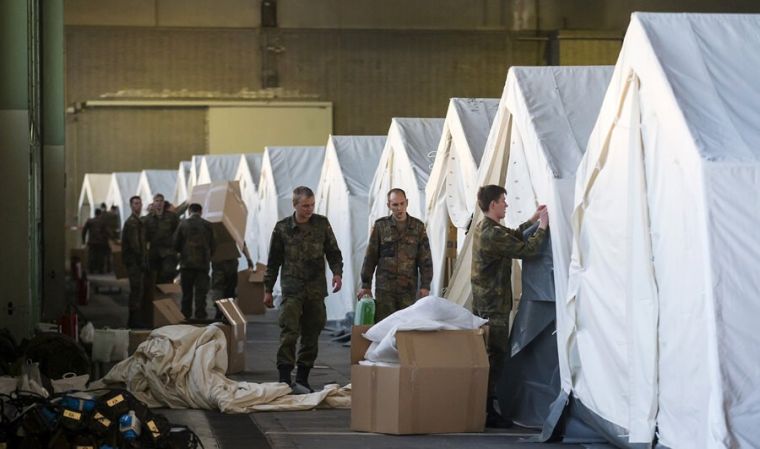Tens of thousands of migrants living in German tents face woes as winter nears

The tens of thousands of refugees in Germany face gloomy and shivering days ahead as winter approaches with them still having no fixed accommodation.
Authorities are reportedly scrambling to find warm shelters for the refugees streaming into Germany every day as temperatures continue to drop, reaching near-freezing during the past week. Snow has already started falling in some parts of the country, according to Reuters.
Citing a survey by the German newspaper Die Welt, Reuters said some of the asylum seekers have been allowed to stay inside sports halls, youth hostels and empty office buildings. But the majority—at least 42, 000—are still living in tents, which are not winter-proof and heated.
"The weather is so cold that I can't even leave the tent," said Taher, a 25-year-old Syrian farmer.
Others who are housed at the camp on the outskirts of Celle, an old town in northern Germany that survived World War II, are also struggling to keep themselves warm despite having a diesel-heater pumping warm air into the tents, said the report.
Bernd Mesovic, deputy director of Pro Asyl, a group that campaigns for refugee rights, lamented the decline in the standard of accommodation provided in Germany, Europe's richest economy.
"In summer, the official policy was to make sure refugees are out of makeshift shelters, especially tents but also sports halls, before winter. But now you just have to be happy there's space in any kind of accommodation at all,'' he noted.
In many regions, Mesovic said people who have been granted refugee status are still living in buildings intended for new arrivals due to a lack of social housing for them to move to.
In the face of rising public scepticism, German authorities assured it can manage the influx of migrants and provide the necessary housing for the expected asylum seekers, whose number is expected to rise up to 800,000 by next year.
Last week, Reuters said at least 380 refugees were evacuated from a tent city and taken to fixed accommodation in the state of Hasse.
In Berlin, authorities vowed to take down tents once three big new accommodation centres open. "They're also planning to put people up in Tempelhof airport, a Nazi-built structure that served as a lifeline for West Berlin during the post-war Soviet blockade, and in the former ICC Congress Centre."
After a street protest action by 100 refugees last week over their unheated tents, Hamburg Mayor Olaf Scholz also assured to make the tents winter-proof or find alternatives, but stressed that the city's top priority is to avoid homelessness.
In Celle, the first huts are expected to arrive this week unless delivery is delayed again. If this happens, refugees will have to stay in tents, the town's mayor, Dirk-Ulrich Mende, told Reuters.
Moreover, authorities said they are also monitoring the possible health consequences of overcrowding and the cold weather in the camps.
In Celle's tent city, about two-third of refugees are suffering from cold, said Herbert Hessler, a doctor at the city. He also noted that refugees sometimes wore damp clothes because the washing hung around the camp cannot dry properly.
Earlier, there were reports of increasing violence and abuses inside refugee camps, which makes living even more depressing particularly to women and children who have been subjected to different kinds of abuses, Reuters said.











